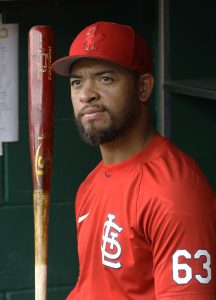1:05pm: Bard’s contract will guarantee him “about $19MM,” Feinsand tweets.
12:52pm: The Rockies and closer Daniel Bard are finalizing a contract extension, reports Mark Feinsand of MLB.com (Twitter link). Jon Heyman of the New York Post, meanwhile, reports that the Rockies have already reached an agreement on a two-year extension for Bard, a client of ISE Baseball (Twitter links).
All indications throughout the summer have been that the Rockies aren’t interested in trading the 37-year-old Bard and rather hoped to keep him beyond the current season. It now appears they’ve succeeded in that goal.
On paper, Bard seemed like the optimal trade candidate: a 37-year-old reliever on an expiring contract and in the midst of a dominant season for a last-place team. The Rockies, however, march to the beat of their own drum perhaps more than any team in the sport and have made a habit of hanging onto conventional trade candidates, even if it means losing key players for nothing, as they did last summer when declining to trade Jon Gray and surprisingly choosing not to issue him a qualifying offer.
Rockies owner Dick Monfort has outwardly spoken about his belief that the team has the makings of a winning club, even if the on-field results have overwhelmingly suggested otherwise in recent seasons. General manager Bill Schmidt, who was elevated from scouting director to the GM’s chair last year after GM Jeff Bridich’s dismissal, plainly told Danielle Allentuck of the Denver Gazette earlier this month that he did not envision being a major seller at this year’s deadline because the organization believes in the talent on the roster. Manager Bud Black has echoed similar sentiments in recent days, rhetorically questioning why the team would trade a “Range Rover” (Bard) for a “Honda Accord” (a package of minor league prospects, presumably).
While it’s certainly fair to question the inherently risky decision to extend a 37-year-old reliever, it’s simultaneously easy to see how the Rockies have become enamored of Bard in the ninth inning. Merely making it back to the Majors after a seven-year absence would’ve been a feel-good story on its own, but Bard not only engineered one of the most improbable comebacks in recent memory — he’s quickly ascended to the ranks of the elite in MLB.
A late-season swoon sent Bard’s 2021 ERA soaring to 5.21 following the trade deadline, but he’s been an absolute powerhouse in Black’s bullpen this year, pitching to a 1.91 ERA with a 27.6% strikeout rate and a 53.8% ground-ball rate. Bard’s 12.2% walk rate is noticeably higher than the league-average mark of 9.1% among relievers, but his penchant for grounders and inducing generally weak contact (87.2 mph average exit velocity) has helped him to mitigate any damage that might arise from at-times spotty control. Bard is also averaging a blistering 98.1 mph on a sinker that can reach triple-digits and make hitters look downright foolish at times.
Relievers are volatile, as Bard himself has shown with his 2021 and 2022 results, so there’s plenty of risk that this deal turns out poorly for the Rockies. The current version of Bard, though, is about as good a reliever as you’ll find anywhere in the league — and the Rockies are clearly confident in his ability to sustain this output even as he approaches his 40th birthday.
From a payroll vantage point, Bard will add another notable salary to a 2023 roster that could well set a new franchise-record in payroll before the front office makes a single roster move. The Rox had $110MM on next year’s books already, and that was before factoring in Bard’s new extension and an $18MM player option that Charlie Blackmon seems likely to exercise. Colorado will also owe arbitration raises to each of Robert Stephenson, Garrett Hampson, Tyler Kinley, Peter Lambert, Austin Gomber and Brendan Rodgers. All of that should push the team right up against or somewhere beyond the current franchise-record mark of $145MM. Further additions this winter could send the Rockies into entirely new payroll territory.
The Rockies will take– and, based on social media reaction, already have taken — plenty of flak for their commitment to retaining a core of players that has generated only a .445 winning percentage dating back to the 2019 season. And while the team’s resistance to rebuilding and staunch belief that the makings of a contender are present can both fairly be questioned, it’s also somewhat refreshing to see a club continue to try to put together a winning club rather than lean into the type of arduous, multi-year rebuilds that have proliferated the sport in recent years. Even if this group never breaks through and emerges as a true postseason contender in future seasons, the Rockies are at least trying — and that’s more than several teams can say each season.

 Sosa, kicked to the bench in a utility capacity, has struggled significantly in 2022. He’s not collected a single homer in 131 plate appearances, hitting only .189/.244/.270 with a 29% strikeout rate. He’s out of minor league option years, so the Cardinals had to either keep Sosa on the active roster or make him available to other teams. They initially chose to option out DeJong to keep both players on the 40-man roster, but the latter has gotten out a strong run at Triple-A Memphis of late. DeJong has a .249/.313/.552 showing with 17 homers in 230 plate appearances since being optioned, and he’ll seemingly be recalled to back up Gorman, Edman and utilityman
Sosa, kicked to the bench in a utility capacity, has struggled significantly in 2022. He’s not collected a single homer in 131 plate appearances, hitting only .189/.244/.270 with a 29% strikeout rate. He’s out of minor league option years, so the Cardinals had to either keep Sosa on the active roster or make him available to other teams. They initially chose to option out DeJong to keep both players on the 40-man roster, but the latter has gotten out a strong run at Triple-A Memphis of late. DeJong has a .249/.313/.552 showing with 17 homers in 230 plate appearances since being optioned, and he’ll seemingly be recalled to back up Gorman, Edman and utilityman 